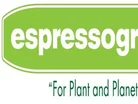Espressogrow: Plant Nutrition from Coffee Ground Waste

About a year ago, Mark Henderson was having a simple chat with a barista when the conversation led to what happens to the coffee ground waste at the end of the day. “They said straight into the bin and off to the landfill, [totalling] 10 to 15 kilograms of waste per day,” said Henderson. “And that was just from one coffee shop site!”
Henderson went home to do some more research on the subject and discovered that “coffee grounds are a great fertiliser by-product” and that no one else in the world was manufacturing a commercial-grade product with it.
“That one conversation led us to developing the business just under a year ago,” said Henderson of the Canberra-based venture he pursued with his business partner Geoff Howell: Espressogrow.
Enlisting the assistance of an organic chemist, the trio designed a 100% organic fertiliser that works with a variety of plant and soil varieties.
“It has some good chemical subsets within it – nitrogen, phosphorus and potassium being the three key ones – and a number of micro-nutrients that assist with micro-organism and plant tissue development under the soil,” said Henderson.
Read the October issue of Business Review Australia here
Espressogrow fertiliser is eco-conscious from development to use, helping sustain plants more effectively than artificial products. Often, “synthetic fertilisation overuses nitrogen and kills a lot of the micro-organisms under the ground. Our fertiliser gives the plants long-term, sustainable access to nitrogen.”
Working with more than 200 coffee outlets in Australia including Hudson’s Coffee and a couple other large chains, Henderson is looking for opportunities to expand the business abroad.
In Europe, for example, the banning of synthetic fertilisers on golf courses has opened a big market potential to Espressogrow. “We’re speaking with [various courses in] Scotland and Dubai about using Espressogrow on their golf courses,” said Henderson, adding that the company hopes to break into the European and South East Asian markets by the end of the year.
“We are in advanced discussions with entities wishing to license our process, product and brand in England, Norway, Spain, South Korea, Slovakia, the US – the list goes on,” Henderson continued. “The global community has really jumped on the back of our eco-friendly product and we are really proud of the progress to date.”
In addition to the dried fertiliser product currently on the market, Espressogrow is currently developing a liquid fertiliser for release sometime in 2013.
There is also potential for the company to expand into the beauty market: “There’s been a lot of research and anecdotal support for coffee grounds as an ingredient in beauty products,” said Henderson. “We currently hold a patent for the manufacturing of a range of beauty products using coffee ground waste as an input. Watch this space on that front!”



